On Venture Capital
December 18th, 2010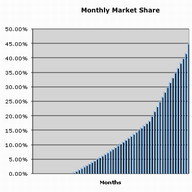
I used to blog more about venture capital and entrepreneurship then my job at BOB came to an end. However, I eventually resumed my studies in the CFA® Program and ultimately passed all three exams. In 2019 I undertook a major refresh and revamp of this blog as once again I found myself with time so I undertook to leverage this blog to actually help my career.
Where to start? Just look at the words themselves, capital even to a Marxist, means something that has value. On the advice of Brad Feld I’m reading “Zen and the Art of Motorcycle Maintenance” right now and that author has a lot to say on Quality, which is applicable to a discussion on Kapital as not all capital is created equal, some of it is of a higher quality. Venture Capital is expensive, but the best VCs will bring more than just dollars to your venture.
Venture is another word that was not chosen randomly, a venture is an expedition, even an “adventure”, in this case the starting of a new business or possibly expanding into a new market or industry. So venture capital is money plus advice traded to an entrepreneur for a portion of his venture in the form of a share in the ownership of the enterprise and future profits it generates. Make no mistake about it, VCs are capitalists, they are in it for the money, pleasant phrases like “building a business”, “helping a company to grow”, or “supporting entrepreneurship” or “creating an environment or ecosystem” appear on websites, but no venture capitalist will invest in your business unless they believes there exists a possibility of a substantial return on their investment, with the possible exception of a few very strategic investors.
Remember the third F is fool not venture capitalist.
Return on Investment
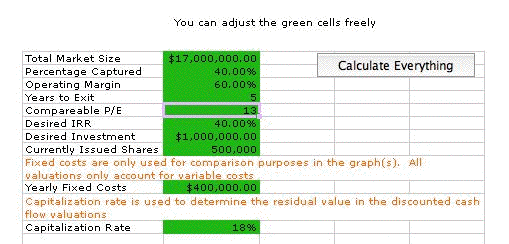
Often abbreviated, ROI is what everyone is looking for, everyone! If you invest time and money into something such as a hobby or a charity you do so because you get something out of the exchange, out of the deal if you will. Maybe it is relaxation, or satisfaction, or a tax receipt, maybe it can’t be measured, but it has some value. VCs are no different they invest time and money (which really are one and the same) and expect to generate a return on their investment.
How do VCs measure ROI
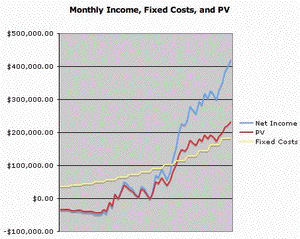
It varies. Different VCs have different investment criteria, strategic investors just want to see a sector/market/niche/technology explored but VCs want a measurable return on the capital they invest. This is achieved in the form of an ‘exit’ from the investment. A successful exit sees the return of every dollar invested plus a large profit. Exits can come in the form of an acquisition by a larger company, this is more likely and more popular post dot.com bubble. An aquisition exit is also more common in some industries. The other successful exit, is the much more sexy, and potentially more profitable exit, an initial public offering or IPO. This is where a portion of the company, the venture, is sold to the public, or more likely an amalgamation of investors including underwriters and other financial institutions. A few extremely successful IPOs led to the dot.com bubble bursting and a lot of money being invested poorly trying to duplicate the success of Amazon.com and others.

I know all that tell me something new!
Not a lot is new in financing ventures. Christopher Columbus had to convince one of the monarchs of Europe to finance his venture to the New World. That particular venture was very expensive, very risky, but paid off in the short term, but in the long term Portugal and Spain are no longer considered world powers, except perhaps in soccer. Most venture capitalists don’t think like monarchs, though some are very much king makers or are thought to have the midas touch.
What venture capitalists really invest in is people. What they should provide is more than just cash.
Full stop! Read the above two sentences over again until it sinks in.

Lots of people in the 1400s had all sorts of ideas about fame and exploration, yet the King and Queen of Castile chose to invest in the Columbus brothers and their plan on sailing West to get to the Far East Orient. It had long been proposed, and by Columbus’s time was considered a fact, that the earth was round, yet it wasn’t until Ferdinand Magellan in 1519 through to 1522, became the first European to circumnavigate the world, that this was accepted. It’s one thing to say something, to posit an idea, it is another to prove it, to put your money where your mouth is. VCs are looking for people not only with a good idea, but a plan, and the ability to pull it off. They invest in doers not just thinkers. How many ships were lost sailing between Europe and the Americas, how many sailing around the Horne of Africa, how many in search of a Northern Passage?
What were the names of Columbus’s three ships?
The Nina, the Pinta, and the Santa Maria.
How many startups failed for every Google, Yahoo, or Baidu?
People remember the big successes but not as readily the many, many, failures.
Columbus and his difficulty in funding a trip across the Atlantic and going to the courts of various rulers is the exact same process entrepreneurs go through trying to find funders for their venture, an observation I’m not alone in making. They give pitches, they provide documentation, accent their strengths, and minimize their weaknesses. It took years for Columbus to get the funding for his venture and modern entrepreneurs too have to hone their pitch and polish their business plan and tweak their slide deck to get the funding they require.
Where’s the beef?
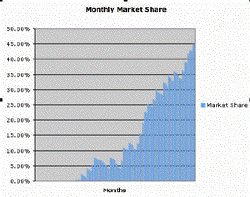
If you’re really looking for venture capital financing you may only get twenty minutes and two pages to entice a VC into further investigating your proposal, so make your words and slides count. A venture capital investment should be more than just a cash transaction, it should be a partnership, a commitment to work together towards a common goal. It is very much like Columbus’s expedition to the New World. Choose your partners wisely, there is a Quality to Kapital.
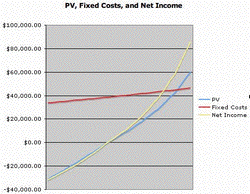
If you’re still with me, here are the resources I’ve recommended in previous posts:
Spreadsheets to play with
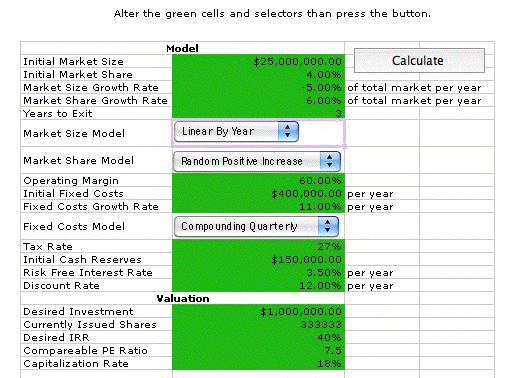
I made these, they were a lot of work, there is no guarantee of accuracy, I retain the intellectual property and copyright to them, feel free to use them, but not as the base of anything you plan to sell commercially. Don’t claim them as your own work, as other have. The first is probably most relevant to perform quick Venture Capital calculations, but the other two use a lot of VBA and produce prettier graphs. You need to enable macros for them to work properly.
- Venture Capital calculations in Excel
- Breakeven Analysis in Excel using VBA
- Breakeven analysis in a growing market
- Spreadsheet for Planning a New Business
Some think venture capital is dead or dying, or that VC money is too expensive, others think angel investors, incubators or accelerators are the future with VCs and public markets playing a lesser role in financing ventures post dot.com bubble. I think if you’ve read this far and don’t think I’m a complete idiot, you should look at my resume.
Presentations by VCs
More Links
- Want to Know How VC’s Calculate Valuation Differently from Founders?
- So you want to be a Venture Capitalist?
This entry was originaly posted on , it was last edited on and is filed under: Advice and tagged: Finance, Spreadsheet, Venture Capital.


How a venture capitalist chooses to structure his investment depends on the style and track record of the venture fund. It can be straight equity, a combination of equity and loans, or a sliding scale of reversion from majority control of the entrepreneur’s stock to minority ownership upon achievement of certain milestones.
Thanks for commenting and taking me seriously.
I never got into fund focus or how the existing investments and even their maturity or closeness to exit, affects all future investments. If the fund has strategic investors which is the case in many Clean Tech or Advanced Materials funds, even fab-less chip companies, can influence which ideas get funded or additional funding.
In Vancouver, Angels are getting a lot of press, along with incubators, and lean start ups with little or no VC funding are the rage at least in online media. I plan to write more on entrepreneurship and business planning as that is where I have more experience, but I know a few VCs and have talked with them and taken their classes and such.
Cheers,